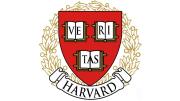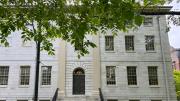The federal government’s Joint Task Force to Combat Anti-Semitism—which on March 7 threatened to terminate $400 million in research funding granted to Columbia, and extracted concessions on how that university administers disciplinary proceedings and on the oversight of Mideast studies and other programs—tonight announced that it is investigating Harvard. The news release, presented as coming from the U.S. Department of Education, the Department of Health and Human Services (HHS), and the General Services Administration, disclosed “a comprehensive review of federal contracts and grants at Harvard University and its affiliates,” covering “more than $255.6 million in contracts between Harvard University, its affiliates, and the Federal Government” and purports to extend to “the more than $8.7 billion in multi-year grant commitments to Harvard University and its affiliates to ensure the University is in compliance with federal regulations, including its civil rights responsibilities.”
No specifics about the covered contracts or future grants were provided; in fiscal year 2024, Harvard received $686.5 million in federally sponsored research funding. Its affiliated hospitals, which are not consolidated with the University, received, in total, more federal support than Harvard.
The government news release quoted Secretary of Education Linda McMahon to the effect that Harvard, “a symbol of the American Dream for generations,” had besmirched its reputation through its “failure to protect students on campus from anti-Semitic discrimination—all while promoting divisive ideologies over free inquiry.” So far as is known, no evidence has been advanced from any formal investigation under Title VI of the Civil Rights act to support these claims—nor have any steps been taken, under the procedures existing for such investigations, to notify the University of findings, to which it is entitled to reply. Having “put its reputation in serious jeopardy,” according to McMahon’s statement, “Harvard can right these wrongs and restore itself to a campus dedicated to academic excellence and truth-seeking, where all students feel safe on its campus.” Again, there are no indications of what steps the government might seek to satisfy its claims. When Columbia was first notified it was being investigated (the first such government action of this sort), it received an intrusive letter several days later demanding specific actions deemed remedial—and with one week to respond.
Tonight’s announcement said only that the government “will collaborate with relevant contracting agencies to assess whether Stop Work Orders should be issued for any identified contracts.” It quoted HHS acting general counsel Sean Keveney to the effect that “We are pleased that Harvard is willing to engage with us on these goals.” Task force member Josh Gruenbaum said that “While Harvard’s recent actions to curb institutionalized anti-Semitism—though long overdue—are welcome, there is much more that the university must do to retain the privilege of receiving federal taxpayer’s hard earned dollars.”
In a statement emailed to the community just before 7:30 p.m., titled “Our Resolve,” President Alan M. Garber wrote:
Earlier today, the federal government’s task force to combat antisemitism issued a letter putting at risk almost $9 billion in support of research at Harvard and other institutions, including hospitals in our community. If this funding is stopped, it will halt life-saving research and imperil important scientific research and innovation.
The government has informed us that they are considering this action because they are concerned that the University has not fulfilled its obligations to curb and combat antisemitic harassment. We fully embrace the important goal of combatting antisemitism, one of the most insidious forms of bigotry. Urgent action and deep resolve are needed to address this serious problem that is growing across America and around the world. It is present on our campus. I have experienced antisemitism directly, even while serving as president, and I know how damaging it can be to a student who has come to learn and make friends at a college or university.
For the past fifteen months, we have devoted considerable effort to addressing antisemitism. We have strengthened our rules and our approach to disciplining those who violate them. We have enhanced training and education on antisemitism across our campus and introduced measures to support our Jewish community and ensure student safety and security. We have launched programs to promote civil dialogue and respectful disagreement inside and outside the classroom. We have adopted many other reforms, and we will continue to combat antisemitism and to foster a campus culture that includes and supports every member of our community.
We still have much work to do. We will engage with members of the federal government’s task force to combat antisemitism to ensure that they have a full account of the work we have done and the actions we will take going forward to combat antisemitism. We resolve to take the measures that will move Harvard and its vital mission forward while protecting our community and its academic freedom. By doing so, we combat bias and intolerance as we create the conditions that foster the excellence in teaching and research that is at the core of our mission.
Much is at stake here. In longstanding partnership with the federal government, we have launched and nurtured pathbreaking research that has made countless people healthier and safer, more curious and more knowledgeable, improving their lives, their communities, and our world. But we are not perfect. Antisemitism is a critical problem that we must and will continue to address. As an institution and as a community, we acknowledge our shortcomings, pursue needed change, and build stronger bonds that enable all to thrive. Our commitment to these ends—and to the teaching and research at the heart of our University—will not waver.
That suggests some sort of negotiation with the government, rather than any immediate recourse to legal action on the University’s part.
Updated April 1, 2025, 9:00 a.m.: It is important to note that the government announcement places the Harvard contracts under review, rather than stopping them outright (as was and still is the case at Columbia). The multibillion-dollar figure given for future commitments must apply to affiliated institutions, like the academic medical centers and hospitals that have teaching and research arrangements with the Medical School (including such preeminent institutions as Mass General Brigham, Boston Children's Hospital, Dana-Farber Cancer Institute, and others)—and therefore suggest a risk to hundreds of continuing clinical trials of therapies, along with basic biomedical research. Among those who have commented on yesterday’s announcements is Eliot University Professor Lawrence H. Summers, president emeritus, who has been a continual, relentless critic of Harvard for what he perceives as insufficient responses to antisemitic behavior on campus; in the extended New York Times report on the news, Summers is quoted as saying, “Just because Donald Trump says something doesn’t make it wrong, and Harvard has been way too slow in responding to the antisemitism.” But he characterized the government review of Harvard and affiliate research contracts as “a pretext for going after truth-seeking institutions that are threatening to would-be authoritarians.” Consistent with his criticism of the government actions against Columbia, he continued, “Harvard has made real errors. But Harvard’s flaws do not remotely justify what is being threatened.”
Updated April 1, 2025, 2:20 p.m.: Although Princeton was not among the 10 universities first targeted in late February for a federal investigation concerning antisemitism, the New York Times reports that it, too, has now had multiple grants suspended. Princeton President Christopher Eisgruber has been among the few active university leaders to speak out against the government’s method of approaching higher education institutions, demanding changes in policy and practice, and withholding funds or threatening to do so. In his announcement to his community, the Times reported, he wrote, “Princeton University will comply with the law. We are committed to fighting antisemitism and all forms of discrimination, and we will cooperate with the government in combating antisemitism. Princeton will also vigorously defend academic freedom and the due process rights of this university.”
Updated April 4, 2025, 8:20 a.m.: The New York Times reports that Brown University’s grants and contracts have now been threatened, too. In what has become a pattern in such cases, Brown apparently learned it has been targeted via a leak to a conservative news outlet, rather than through any notice from the government. Brown President Christina Paxson recently joined Princeton’s Christopher Eisgruber in speaking out against the federal government’s use of contract funding to exert leverage against universities in civil rights and antisemitism investigations—among the only sitting presidents of targeted institutions to do so. On March 20, she wrote: “The nation has witnessed what many in higher education fear may be only the first examples of unprecedented government demands placed on a private university as a condition for restoring federal funding. Some of these demands raise new and previously unthinkable questions about the future of academic freedom and self-governance for those that are committed to continuing to serve this country as leading research institutions.” Brown will always follow the law, she continued, and will also “always defend academic freedom and freedom of expression, for the University as an institution and for individual members of our community.” Finally, it will defend international members of its community facing challenges from the administration’s aggressive immigration actions.
This is a developing story; check back for additional reports.








